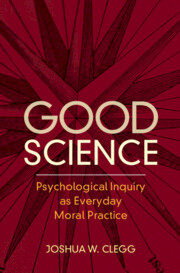Book contents
- Good Science
- Good Science
- Copyright page
- Dedication
- Contents
- Preface
- Acknowledgments
- Introduction
- Part I Clearing the Ground
- Part II Good Science
- Part III Charting the Moral Geography of Psychological Research
- 8 Domain and Theory Choice
- 9 The Design and Conduct of Research
- 10 The Interpretation and Reporting of Research
- 11 Conclusion
- Book part
- References
- Index
10 - The Interpretation and Reporting of Research
from Part III - Charting the Moral Geography of Psychological Research
Published online by Cambridge University Press: 06 January 2022
- Good Science
- Good Science
- Copyright page
- Dedication
- Contents
- Preface
- Acknowledgments
- Introduction
- Part I Clearing the Ground
- Part II Good Science
- Part III Charting the Moral Geography of Psychological Research
- 8 Domain and Theory Choice
- 9 The Design and Conduct of Research
- 10 The Interpretation and Reporting of Research
- 11 Conclusion
- Book part
- References
- Index
Summary
In Chapter 10, I discuss the moral context of research interpretation and reporting. I describe interpretation as the constitution of evidence within an epistemic frame characterized by the totality of (always at least partly moral) commitments underlying analytic choices. These analytic choices include those concerning what is worthy of study, what kinds of methods and forms of evidence are considered acceptable, and what kinds of claims are warrantable. I also emphasize the ways that evidence is not merely gathered nor reported, but constituted within a rhetorical and political context. In the latter half of the chapter, I discuss the moral affordances of research reporting, focusing on questions of fairness, honesty, representation, and other considerations involved in report authoring. I focus specifically on questions of: collaboration and credit; style and representation; venue, availability, and audience; submission, editorial, and revision; and the dissemination and use of research reports.
- Type
- Chapter
- Information
- Good SciencePsychological Inquiry as Everyday Moral Practice, pp. 124 - 136Publisher: Cambridge University PressPrint publication year: 2022

